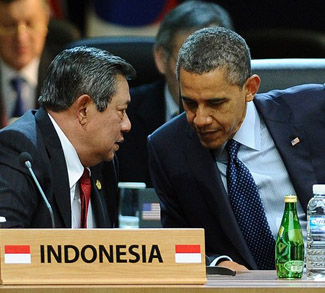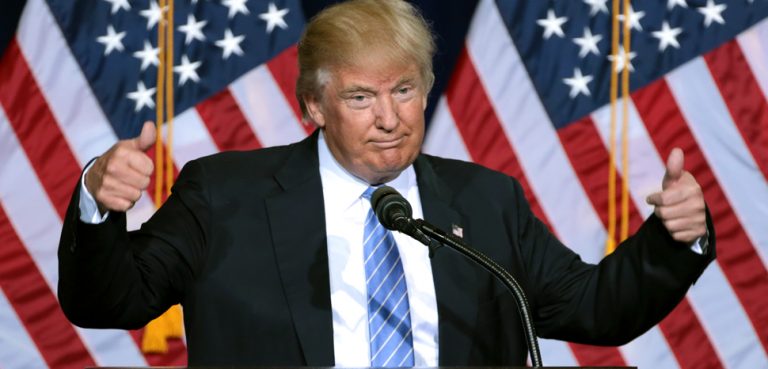With increased Chinese assertiveness in the South China Sea and a re-posturing of U.S. focus towards East Asia, the most powerful Southeast Asian state finds itself at a crossroads as it seeks to balance long-standing relations with the U.S. and the growing importance of its relationship with China.
Since the ouster of authoritarian President Suharto in 1998, Indonesia has undergone a considerable period of political transformation. The post-Suharto period – known as “reformasi” – has seen a number of key reforms implemented. These have been aimed at transitioning Indonesia towards democracy and enhancing good governance.
One of the most important of these reforms has been the transferring of power from Indonesia’s highly-centralized federal government to provincial-level administrations. With 240 million people belonging to 490 ethnic groups spread across 17,000 islands, Indonesia has long been faced with several separatist conflicts. This devolution of power has been essential in helping to quell some of these conflicts.
These political developments within Indonesia have not just improved the domestic political climate. They have also opened the door to a closer relationship with Washington.
Indonesia’s bilateral relations with the United States are already well-cemented. It was seen as a strategic anti-communist bulwark during the Cold War, and as the world’s most populous Muslim country, Indonesia has also emerged as a key regional ally in the global war on terror. A hefty price has been paid for this anti-terror coordination with the U.S however, as evidenced by the Bali bombings and the ongoing struggle with homegrown fundamentalist movements like Jemaah Islamiyah.
But US-Indonesian relations go far deeper than just the war on terror. Indonesia’s 17,000 islands contain some of the most strategically-significant waterways in the world – namely the straits of Malacca, Sunda, and Lombok. These straits see nearly half of the global merchant fleet pass through them every year, as well as a much of Northeast Asia’s energy supplies. These waterways also contain some of the highest instances of piracy on earth. Ensuring the security of the straits and the goods that travel through them is an important strategic objective of the United States.
International focus on Southeast Asia in recent years has centered on increased Chinese activity in the area. China’s rapid naval modernization has gone hand-in-hand with a growing assertiveness in the South China Sea. The South China Sea and surrounding areas contain an estimated 28 billion barrels of oil, making control of the tiny islands that dot the sea a strategic imperative for regional actors. China, Vietnam, the Philippines, Malaysia, Taiwan and Brunei all have overlapping claims to the islands. This has led to armed skirmishes between China and some of its Southeast Asian neighbours- the most recent of which being with the Philippines over the Scarborough Shoal.
China’s increased military presence is understandably making its neighbours nervous. It is this fear that is driving Southeast Asian countries like Vietnam and the Philippines into the arms of the United States. Indonesia however is somewhat of a unique case. Barring the tiny Natuna Islands near Borneo, Indonesia has very few overlapping land-claims with China. This has precluded any physical skirmishes with the PLA Navy.
In fact, there has been a marked lack of any substantial confrontation between China and Indonesia, and there are a few factors that may explain why. Nearly all of Indonesia’s pressing security concerns are internal – be they secessionist movements in Aceh and West Papua, or Islamic insurgents. China is not viewed as the threat that other countries in the region take it for, and most Indonesians hold favourable views of China (67%). There are also substantial trade links between the two powers (bilateral trade of $25.5 billion in 2009), so both countries will think twice before provoking the other.
While both the U.S. and China have been courting Indonesia, having Jakarta on friendly terms with Beijing could in fact serve as a boon to U.S. interests in the region. Washington has little interest in seeing more Chinese vessels in the South China Sea. With Vietnam and the Philippines actively seeking U.S. support to counter the growing Chinese presence in the area, Indonesia has the potential to serve as the lynchpin of a coalition of regional actors, perhaps under the auspices of ASEAN. This is one case where Sino-US competition doesn’t need to be a zero sum game. Indonesia’s good relations with China may be the key to a peaceful solution in the South China Sea.
Indonesia’s short-term strategic interests are based on carefully balancing its relationships with the United States and China. While its neighbours ratchet up anti-Chinese rhetoric over miniscule islands, Jakarta has chosen to follow a path of moderation. As an emerging middle-tier power, Indonesia cannot afford to sacrifice its deepening economic ties with China in favour of a stronger relationship with the U.S., as many of the other states in the region have already done. Thus, Indonesia will likely continue to pursue the middle-ground in conducting its relations in the near future.




